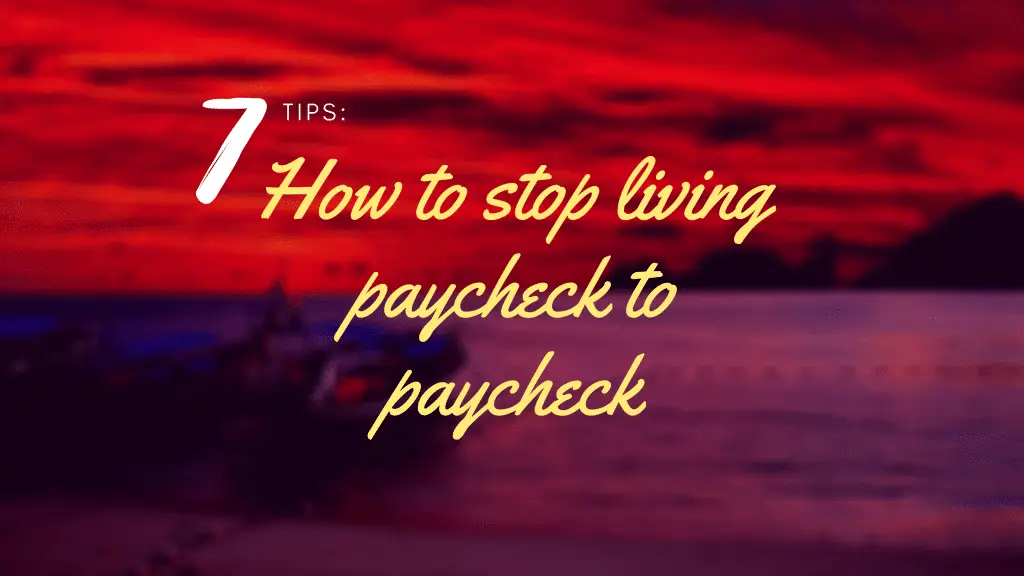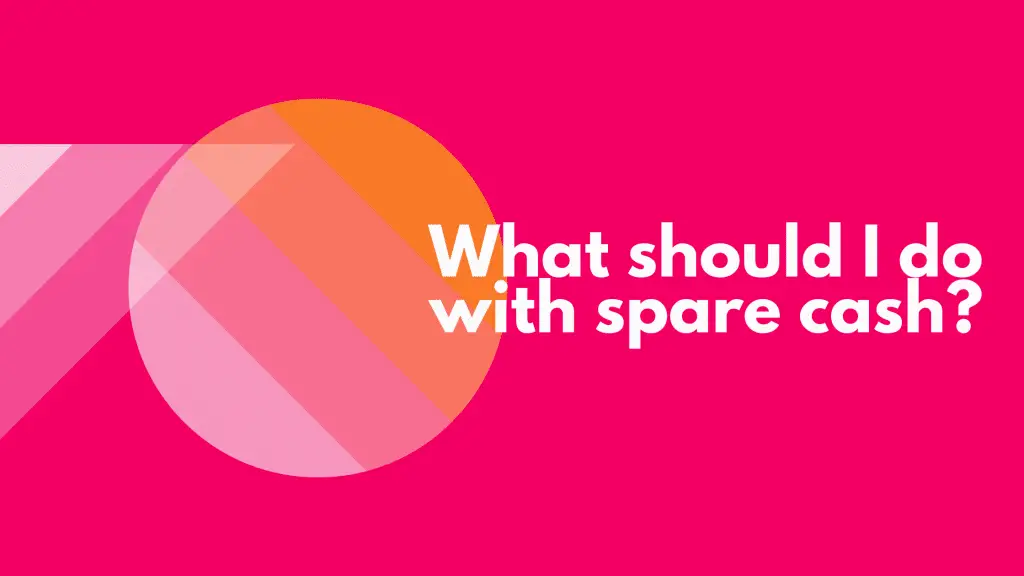Lobster at the start of the month and baked beans at the end? Living month to month for too long becomes very, very tiring. Not to mention unproductive for your personal finances. Let’s discuss how to stop living paycheck to paycheck!
First, let’s take stock
So you can’t get through the month with money left in your bank and have to yo-yo your lifestyle through the month in order to get to the next payday.
You probably don’t need me to tell you why this is such an annoying situation to be in; unable to have a consistent lifestyle, inability to afford the basics at the end of the month, worries over bills, unexpected costs creeping in and unable to save for the future.
There is only one reason that you are consistently living paycheck to paycheck.
You are not making a personal profit.
A personal profit is simply your income minus all of your expenses. Formulaically, it is expressed as personal profit = income – expenses.
This is the bedrock of your financial situation and it all boils down to this.
If you operate at a personal loss for too long, you rack up consumer debts (or erode your savings if you had any).
How do you know if you are making a personal profit or not?
The most definitive way to know is setting yourself up a budget, running through your historic spending and income to figure out whether over that time period you have made or lost money.
However, without doing that there are some pretty strong signs that you are in a personal loss:
- you are living paycheck to paycheck
- your credit card debt and overdraft is increasing each month
- your savings are decreasing each month
- you have had to use a payday loan
You may not be running at a deep personal loss where you are increasing your debt and eating into your savings.
Instead you may be spending almost exactly the amount of money you earn, and simply spending too much at the beginning of each month and then reigning in the expenses during the second half of the month.
If so, then you’ve done well by adjusting your lifestyle as a result of financial pressures to make sure you didn’t go into a personal loss and start racking up debt.
However, in all of these instances, the solution has to be around moving you into a personal profit.
This means that your expenses have to be consistently lower than your income.
How to stop living month to month
1. Build a budget
The whole budgeting process of running through your previous spending and setting an explicit, realistic target for your spending helps to keep you accountable.
More importantly, it gives you intent behind the way you manage your finances.
Set a budget that is lower than your average monthly income, and you will have personal profit left over that can be used to pay off debts, save or invest.
Remember here that the key is to make sure that your expenses are lower than your income. This is the quickest and easiest way to give your finances a shot in the arm.
There are some easy (and some not-so-easy) ways to make quick and painless savings:
2. Cancel your unused or under-used subscriptions
These have to be the lowest of all the lowest hanging fruit for you to pick – giving your finances a shot in the arm for minimal effort.
Run through your bank statements and whenever you see a recurring, automatic subscription ask yourself a few questions:
- Do I use this service regularly?
- Would my life suck without this service?
- Do I feel I get good value for money from this service?
- Can I replace this service with a cheaper (or free) alternative?
These are the classic “Entertainment” type expenses, and the easiest to cut or to shrink with diligent attention.
Do you really need access to Amazon Prime Video, Netflix, Disney+ AND Now TV? Try streamlining to the provider you consider the best.
The same needs to be applied to magazine or online news subscriptions and online services. Nothing should go untouched!
You should be left with a set of services that you truly value and need.
If you’re still left in a personal loss after doing this, I would suggest getting more brutal and cutting even the ones you enjoy but can easily replace with an alternative. For example cancelling Netflix and replacing with a simple freeview box (less TV time is never a bad thing anyway!).
3. Make easy savings on your bills and utilities
Another load of easy savings to be had.
Run through your statements once more to find regular direct debits for your utilities and regular bills. Think:
- Broadband / telephone
- TV (i.e Sky / Virgin etc)
- Mobile phone
- Water / Gas / Electricity
- Gym / fitness clubs
Water/Gas/Electricity
Jump onto a price comparison website to see if you can switch to a cheaper deal. I’ve not used them personally, but I like the idea of this service offered by Look After My Bills, who handle this process for you.
TV
Once again, apply the same principles as above for your under-used subscriptions and ask yourself whether there is a better alternative out there. This is an easy one to unlock potentially £100s per month in savings if you switch out for simple freeview.
Broadband
Once again, check for a cheaper plan on a price comparison site.
Mobile phone
Avoid getting caught up in the hype of the contract merry go round. Do you really need to upgrade your phone after 1.5 years or is that just the network trying to keep you locked into a £60 per month contract? Is there really a significant enough difference in performance or aesthetics for that new handset to be worth it?
If you step off this merry go round and keep your handset after the contract period, you can drop down to a sim-only plan with bags of data for silly money like £10 per month. Pocket the change of £50/month upwards!
4. Slash your borrowing costs
If you have an active balance on a credit card or overdraft, then you need to make sure you’re getting the cheapest deal you can otherwise you’re literally throwing money away in interest payments.
Most credit cards hold an interest rate of 15%+, which is pretty massive.
Shop around on price comparison websites and see what else is available for you to cheapen your cost of debt, even if that means shifting your credit card debt onto a personal loan (which tends to be cheaper). Another idea is to take out a new credit card with a 0% balance transfer offer. Just be sure to cancel and cut up your old card/account once it is moved across to stop you from being tempted to overspend.
Word of caution though is that by moving your credit card debt onto a personal loan, you’re likely going to be moving from having to make minimum repayments on the credit card over to making repayments of both capital and interest on your personal loan which may be higher. Make sure you do thorough research on the best options for your specific situation.
5. Travel savings
Travel costs are another big line item in most people’s monthly budget.
Is there anything you can do here to save cash to help you stop living paycheck to paycheck?
- Try walking or cycling to work if the distance allows you (this may even allow you to cancel that gym membership!)
- If you don’t regularly use your car, consider selling it and using public transport instead. If you use it infrequently for long journeys, you can just hire a car for those instead. You’ll be surprised that it will probably still save you money as it costs you insurance and tax just to keep a car sitting there idle.
- Try renegotiate with work for a 1 day per week work from home (or more if they support it!)
- Try renegotiate with your work to move to a 10 hour day / 4 day work week structure, giving you 1 day a week travel free
- Try car-sharing
- Take public transport!
6. Hack your monthly discretionary spending
This was the one that destroyed my budget each month before I found a way to effectively manage it.
I meticulously planned my budget, knowing exactly where each of my £s were going once I was paid. I moved all of my discretionary spending over to my separate current account which I use exclusively for my discretionary spending so I can track it easily (such as entertainment, groceries and travel).
However, as I put my full months budget into this account in one go, I found I was living the life of riley for the first 2 weeks and then having to cut back massively in the last 2 weeks. Oops!
So I developed a system that goes like this:
- I get paid, and transfer my monthly discretionary spending budget (entertainment, travel and groceries categories) into a separate savings account titled “living expenses”
- I then transfer in one weeks’ worth of these “living expenses” into my separate discretionary-spending current account each week (normally a friday!).
This means that it is an automated process and I don’t need to remember to transfer cash.
It also means that it is super easy for me to understand how I am tracking vs my budget. I simply load up my discretionary spending account app and see how much I have in it. I know that this amount should last me until the next week (or whenever it is I’ve set it up to transfer my next week’s worth of cash in).
An absolute game-changer for me.
A method I tried previous to that, which may work for you was the physical cash envelope method. I took out each weeks’ worth of discretionary spending as physical cash. I then could see the physical pile of cash dwindling as the week went on, which acted as a good reminder of whether I could or could not afford something. I never carried a card to make sure I wouldn’t be tempted.
However, this is fairly inconvenient and not ideal in emergencies (I would always recommend carrying a card!), so give it a try for a bit to try and get into a habit, but switch to the digital version like I do once you’re into the habit of it.
7. Track your spending
I use the method above to track my discretionary spending that works really well.
However, I would recommend you track all of your other spending items at least monthly to begin with whilst you are trying to stick to your budget and before you have your new budget-friendly habits in place so that you can course-correct if you are over or under spending each month.
This will make sure that you have budgeted the correct amount for your bills, utilities and other items.
Hold the phone, is living paycheck to paycheck actually a bad thing?
It depends whether it is intentional as part of your budget to engineer a personal profit or not.
If you are doing it to hit your budget, then I’d argue it is actually a good thing. I go through this experience all the time and shows that your budget is trying to change some of your default spending habits.
However, if you aren’t yet in a situation of generating a personal profit then the fact you are living paycheck to paycheck is a symptom of the issue – and you need to implement some of these tips above to help get you to a personal profit positive situation.
Me? I live paycheck to paycheck almost every month.
I squeeze every last pound out of my discretionary spending and I can count on one hand the amount of times I’ve underspent my budget for these items in over 2 years.
However, I am still able to pay off debt, save and invest.
How?
Because I make a personal profit each month because my income is higher than my expenses.
I have set a budget for my monthly acceptable spend for each of my big categories. I have a discretionary spending budget which I find really hard to stick to, but which I have a system set up for that works. I would love for this budget to be higher, but I find that I can live a sustainable and enjoyable lifestyle at this level that I can stick to, whilst also providing enough of a personal profit to use to save and invest towards my financial goals.
So to me, trying to stick to my budget feels sometimes like I’m living paycheck to paycheck.
Am I actually living paycheck to paycheck? Nope, I can call on that cash if I need to, but I choose not to.
This will likely be the same approach if you follow the “pay yourself first” approach to saving. If you hit your budget, you’ll have a personal profit of £200 per month? Perfect, the minute you get paid put this £200 profit into your savings account, invest it or pay off debt.
Have these strategies helped you to stop living paycheck to paycheck and month to month? If so, I would love to hear from you in the comments section below or drop me an email via our contact form!
How Do I Invest In The Metaverse?
Heard Facebook rebranded its corporate identity to Meta? This was the first introduction to the…
How To Cancel Glossybox UK
Wanting to cancel your monthly beauty box subscription? We’ve laid out the steps you need…
Moneyfarm vs Vanguard: Lowest Fees On The Market?
Investing is the most impactful tool you have to reach an ambitious financial goal. Sometimes…
How To Cancel Racing TV UK (Sky or Direct)
Staying on top of your monthly subscriptions can help to streamline your finances. You may…
How Much Does It Cost To Own A Car UK
If you’re looking to buy a car in the UK, it’s important to be aware…
How To Stick To Your Budget When Nothing Works
We’ve all been there, built a kick-ass budget but you’re unable to stick to it….
Snoop vs Emma: Which Is Best?
Ever had the joy of tagging up your monthly bank statements manually in a spreadsheet?…
What should I do with spare cash?
Have you just come into some excess or spare cash? Maybe an inheritance, a bonus…
How To Save Money On Food Without Cooking (It Can Be Done!)
Food is often one of our biggest expenses. A burrito here and a burger there…
How To Cancel Unite Union Membership in the UK
Looking to cancel your Unite Union membership but unsure where to start? We’ve done the…













Pingback: Easy and painless ways to save money every month - Personal Profit
Pingback: What Is A Good Percentage To Save From Your Paycheck?